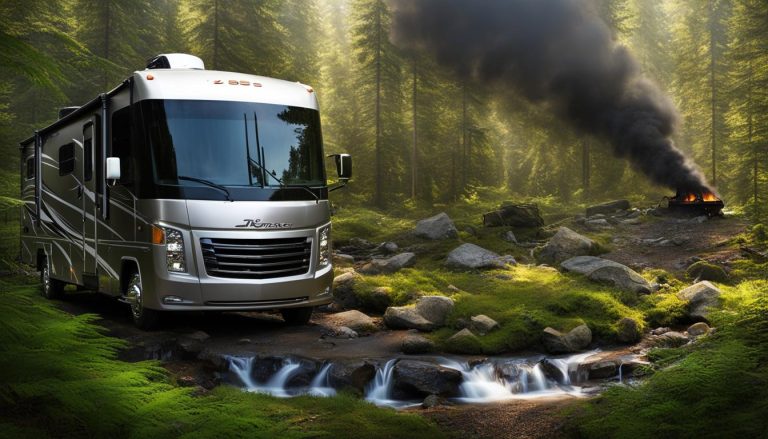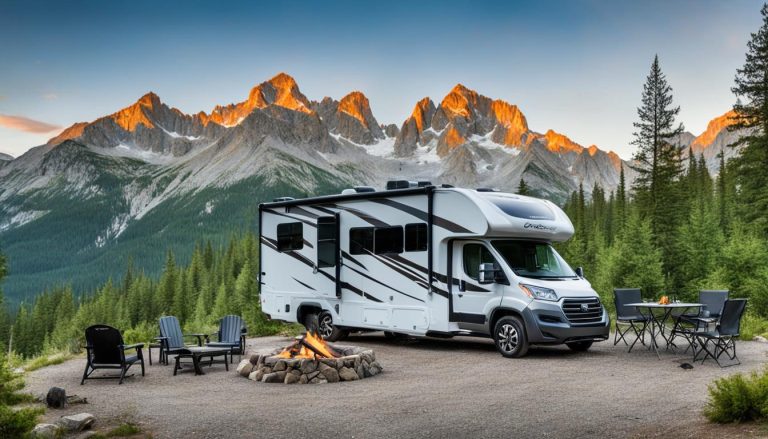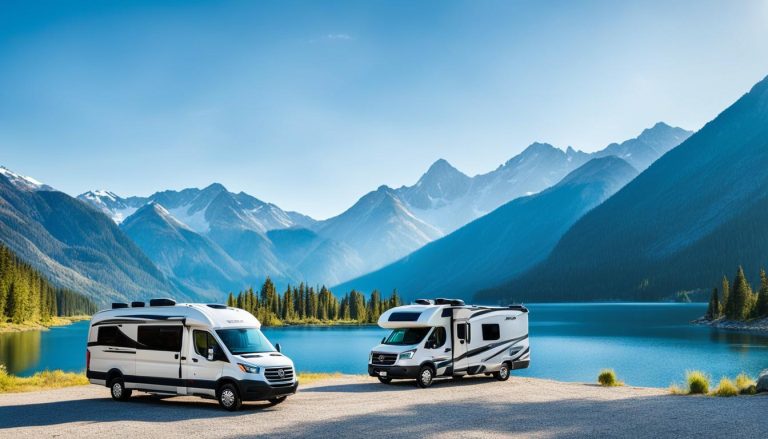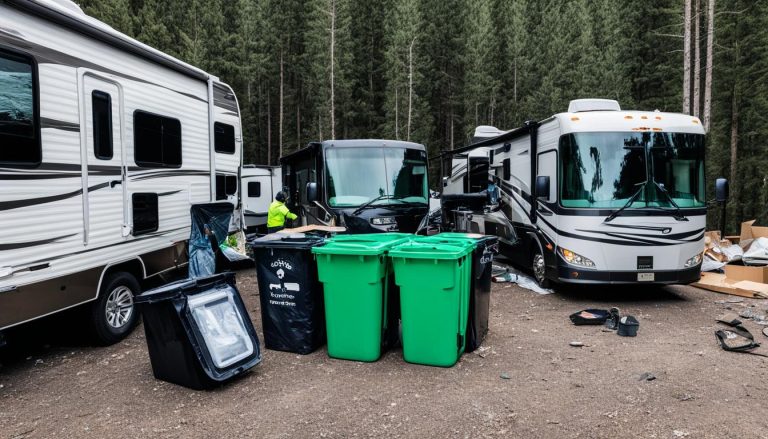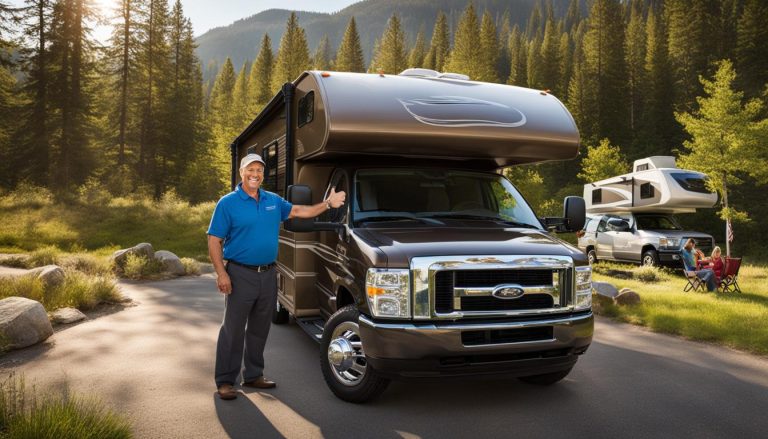Master How to Negotiate RV Price Effectively
gorvlifestyle.com and its partners may earn a commission if you purchase a product through one of our links
When it comes to purchasing an RV, negotiating the price is a crucial step in getting the best deal. Whether you’re buying from a dealership or a private seller, employing effective negotiation tactics can save you money and ensure you get the RV of your dreams without breaking the bank. In this article, we’ll provide you with valuable tips and strategies to master the art of negotiating RV prices.
Key Takeaways:
- Research the market value of the RV to determine a fair offer.
- Understand the seller’s perspective to align your negotiation strategy.
- Know when to walk away if the seller isn’t willing to meet your desired price.
- Have alternative options in mind to negotiate more confidently.
- Ensure all necessary paperwork is completed accurately and review the terms of the agreement before closing the deal.
Researching the Market Value of an RV
Before entering into negotiations for purchasing an RV, it’s essential to conduct thorough research on the market value of the specific RV you’re interested in. This will enable you to approach the negotiation process confidently and strategically, armed with the knowledge required to secure the best possible deal.
To determine the market value of an RV, consider the following best strategies for negotiating the RV price:
- Look for comparable models: Start by researching comparable models of the RV you intend to purchase. This includes exploring both dealerships and private sellers. By examining the selling prices of similar RVs, you can gain valuable insights into the fair market value to establish a benchmark for negotiation.
- Consult expert advice: Seek guidance from industry experts and trusted sources that provide insights on negotiating RV costs. Their expertise can help you navigate the complex market and provide you with proven techniques for bargaining the RV price effectively.
By following these strategies, you position yourself as an informed buyer capable of making a well-informed offer. Additionally, it allows you to identify if the RV you’re interested in is overpriced, enabling you to negotiate from a position of knowledge and confidence.
Benefits of Researching Market Value
Researching the market value of an RV before negotiating its price has several advantages:
“Knowing the fair market value of the RV gives you an upper hand during negotiations. It helps you gauge the seller’s ask against the prevailing market trends and ensures you don’t overpay for your RV purchase. Armed with this information, you can present more compelling offers and negotiate with confidence.”
Expert Advice on Negotiating RV Cost
“When it comes to negotiating the cost of an RV, understanding the market value and using proven strategies can significantly improve your chances of getting the best deal. By leveraging expert advice on negotiating RV costs, you can save money, maximize your budget, and walk away with an RV that meets your needs.”
Remember, the key to a successful negotiation lies in doing thorough research on the market value and utilizing expert strategies for bargaining the RV price. Armed with this knowledge, you can confidently navigate the negotiation process and secure a fair and favorable deal.
Understanding the Seller’s Perspective
Sellers of RVs, whether they are dealerships or private individuals, have their own motivations and goals in the negotiation process. To master the art of negotiating RV price, it is crucial to understand their perspective and formulate a strategy that aligns with their needs.
For instance, dealerships may be more willing to negotiate towards the end of the year or during slow seasons when they want to clear inventory. By recognizing these patterns, you can time your negotiation effectively and take advantage of their desire to make a sale. Similarly, understanding the motivations of private sellers can provide leverage in your negotiation. If they need to sell the RV quickly, they may be more flexible with the price.
Learning to see the negotiation process through the seller’s eyes gives you valuable insight and allows you to approach the discussion with empathy and understanding. This can open the door to more fruitful negotiations and the potential to save money on your RV purchase.
Key Considerations:
- Analyze the timing of your negotiation to align with the seller’s motivations
- Recognize the needs of dealerships and private sellers
- Approach negotiations with empathy and understanding
Example:
Imagine you are interested in purchasing an RV from a dealership. It’s the end of the year, and you know that dealerships want to clear their inventory to make way for new models. This presents an opportunity for you to negotiate a better price. By understanding the seller’s perspective, you can confidently approach the negotiation, knowing that the dealership may be more willing to strike a deal. This insight can empower you to save money on your RV purchase.
| Seller Type | Motivations |
|---|---|
| Dealerships | Clear inventory, make room for new models, meet sales targets |
| Private Sellers | Quickly sell the RV, free up space, generate cash |
Understanding the seller’s perspective is a vital aspect of mastering the art of negotiating RV price. By considering their motivations and tailoring your strategy accordingly, you can increase your chances of securing a favorable deal.

Knowing When to Walk Away
One of the most effective tactics for securing the best RV deal and unlocking the secrets of RV price negotiation is knowing when to walk away. If the seller is unwilling to meet your desired price or shows no willingness to further negotiate, it’s crucial to be prepared to walk away from the deal. This action demonstrates your seriousness about getting a fair price and often prompts the seller to reconsider their offer.
Walking away can be a powerful negotiation strategy that gives you an advantage. By showing that you are willing to walk away, the seller may feel pressured to make a better deal to prevent losing the sale altogether. This approach can lead to significant price reductions and more favorable terms.
However, this tactic only works if you have a clear understanding of your maximum budget and are committed to sticking to it. Before entering into negotiations, determine your financial limit and ensure you are comfortable with that amount. This knowledge empowers you to make confident decisions during the negotiation process.
Example Negotiation Scenario:
Buyer: I’ve done my research and have found similar RVs priced at $45,000. I’m willing to offer $40,000 for this RV.
Seller: I can’t go lower than $44,000.
Buyer: I understand, but $44,000 is above my budget. I appreciate your time, but I think I’ll have to explore other options. Thank you.
By respectfully walking away from the negotiation, the buyer indicates their firm stance on their budget and willingness to find a better deal elsewhere. This can spur the seller to reconsider their position and potentially come back with a more favorable offer.
Remember, being prepared to walk away is a negotiation secret that can help you secure the best RV deal by putting pressure on the seller to meet your terms. Stick to your budget and be confident in your decision to walk away if the seller cannot accommodate your needs.
Next, we’ll explore the importance of having alternative options in mind during RV price negotiation. Having backup choices can give you more leverage and increase your chances of obtaining the best deal possible.
Having Alternative Options in Mind
To negotiate effectively in the RV purchasing process, it’s crucial to have alternative options in mind. This strategic approach provides you with leverage during the negotiation process, ensuring that you aren’t solely dependent on one specific RV. By researching other RV models that meet your needs and have comparable features and prices, you gain the ability to walk away from a negotiation if the seller is unwilling to meet your desired price.
Having alternative options not only empowers you to make confident decisions but also signals to the seller that you have other potential choices available. This knowledge can motivate them to reconsider their offer and work toward a mutually beneficial agreement.
When exploring alternative options, consider gathering information on various RV models, their features, and pricing. Compare these options to the RV you’re negotiating for, allowing you to evaluate the value and potential savings of each choice.
Researching Comparable RV Models
To expand your options and bargaining power, research comparable RV models that align with your requirements. Look for models with similar features, specifications, and quality standards. By evaluating multiple options, you create a broader perspective on the market, enhancing your ability to negotiate effectively.
Consider these steps when researching alternative RV options:
- Identify your essential requirements in an RV, such as size, amenities, and specific features.
- Explore reputable RV dealerships and online marketplaces that offer a wide selection of RV models.
- Compare the features and pricing of different RV models to gain a comprehensive understanding of the market.
- Note the models that satisfy your criteria and align with your budget.
Remember, the purpose of researching alternative options is not to switch RVs, but to have a strong negotiating position. Armed with knowledge about comparable models and prices, you can confidently discuss and negotiate the cost of your preferred RV.
Quotes from RV Experts
“Researching alternative RV options is an excellent strategy when negotiating the price. It lets the seller know that you have done your homework and have other viable choices. This knowledge gives you the confidence to negotiate on your terms.”
– RV Guru
“Having alternative options in mind allows you to walk away from a negotiation that doesn’t meet your desired price. It puts you in the driver’s seat and increases your chances of securing a great deal on the RV you truly want.”
– RV Negotiation Pro
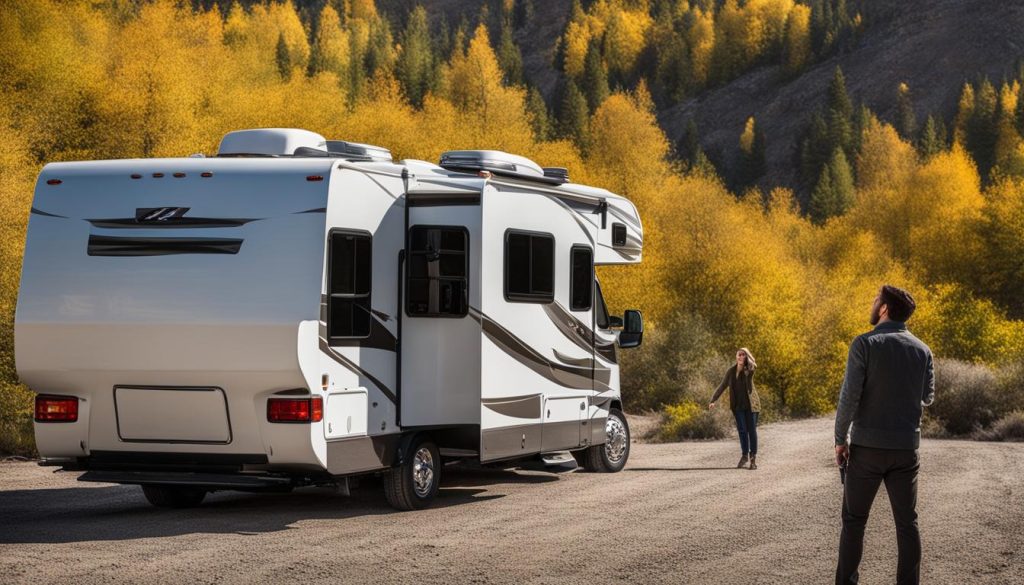
By having alternative options in mind, you ensure a more successful negotiation experience while purchasing an RV. The ability to walk away from a deal and present other viable choices helps you assert your position and secure a fair price for the RV of your dreams.
Closing the Deal
Now that you have successfully negotiated the price for your dream RV, it’s time to close the deal. This final step is crucial in ensuring a smooth and successful transaction. To begin, make sure that all necessary paperwork is completed accurately. Take the time to review the terms of the agreement before signing, ensuring that everything is in line with your expectations.
Consider taking an extra step to ensure the RV’s condition by getting a professional inspection. This will provide peace of mind and help you identify any potential issues before finalizing the purchase. It’s always better to be proactive and address any concerns early on.
Additionally, don’t forget to secure appropriate RV insurance coverage before taking ownership. Adequate insurance will protect your investment and give you peace of mind on your future adventures. Consult with an insurance professional to make sure you have the right coverage that suits your needs.
Closing the deal effectively involves attention to detail and thoroughness. By following these best strategies for negotiating RV price and employing effective tactics, you can ensure a successful outcome and enjoy many unforgettable moments on the open road with your new RV.
FAQ
How important is it to research the market value of an RV before negotiating the price?
Researching the market value of an RV is crucial before negotiating the price. It gives you a benchmark to determine a fair offer and helps you negotiate from a position of knowledge and confidence.
Why is it important to understand the seller’s perspective when negotiating the price of an RV?
Understanding the seller’s perspective allows you to formulate a negotiation strategy that aligns with their needs. Factors such as dealership sales objectives or a private seller’s urgency to sell can influence their willingness to negotiate.
What should I do if the seller is not willing to meet my desired price?
If the seller is not willing to meet your desired price, you need to be prepared to walk away from the deal. This shows that you are serious about getting a fair price and can prompt the seller to reconsider their offer.
Why is it beneficial to have alternative options in mind when negotiating the price of an RV?
Having alternative options gives you leverage in the negotiation process and allows you to walk away from a deal if the seller is not willing to meet your desired price. It also gives you more confidence to negotiate, knowing that you have other potential options available.
What should I consider when closing the deal on an RV purchase?
When closing the deal, ensure all necessary paperwork is completed accurately and review the terms of the agreement before signing. Consider getting a professional inspection to ensure the RV is in good condition and secure appropriate RV insurance coverage before taking ownership.

